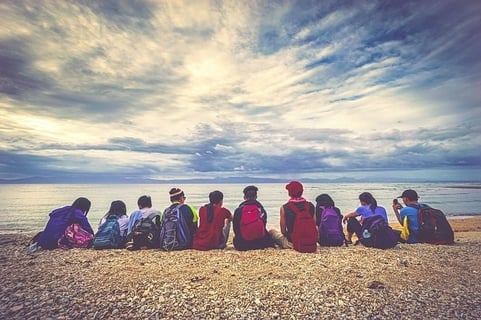Home — Essay Samples — Education — Education System — Contrast High School and College

Contrast High School and College
- Categories: Education System
About this sample

Words: 501 |
Published: Mar 20, 2024
Words: 501 | Page: 1 | 3 min read
Table of contents
Academic environment, academic workload, freedom and responsibility, social life, academic expectations.

Cite this Essay
To export a reference to this article please select a referencing style below:
Let us write you an essay from scratch
- 450+ experts on 30 subjects ready to help
- Custom essay delivered in as few as 3 hours
Get high-quality help

Dr. Karlyna PhD
Verified writer
- Expert in: Education
+ 120 experts online
By clicking “Check Writers’ Offers”, you agree to our terms of service and privacy policy . We’ll occasionally send you promo and account related email
No need to pay just yet!
Related Essays
1 pages / 468 words
2 pages / 1095 words
2 pages / 701 words
5 pages / 2422 words
Remember! This is just a sample.
You can get your custom paper by one of our expert writers.
121 writers online
Still can’t find what you need?
Browse our vast selection of original essay samples, each expertly formatted and styled
Related Essays on Education System
Let’s face it, education hasn’t always been for everyone. Back when Malaysia was under colonial rule, schooling was just for the elites—rich folks and people in power. The average Malay? They were stuck [...]
Jamila Lyiscott’s essay, “Three Ways to Speak,” delves into the complexities of language and communication, particularly within the context of African American Vernacular English (AAVE) and its place in academia. Through her [...]
Standardized testing is a form of test that involves all test takers to answer the same question and scores them in a consistent manner wherein it is possible for those who gave the tests to compare and evaluate the performance [...]
Victor Rios' book, Punished: Policing the Lives of Black and Latino Boys, presents a compelling analysis of the criminalization of young Black and Latino boys in the United States. Rios, a former gang member turned professor, [...]
Basas, B. (2018). Homework should not be seen as a burden but as an avenue to instill discipline and responsibility among learners. Manila Bulletin. Department of Education (DepEd). (2018). No Homework Policy for Public [...]
Single-gender education that’s also known as unmarried-gender schooling is a system in which training technique is carried out one at a time for boys and women; either in separate establishments or in separate classes within the [...]
Related Topics
By clicking “Send”, you agree to our Terms of service and Privacy statement . We will occasionally send you account related emails.
Where do you want us to send this sample?
By clicking “Continue”, you agree to our terms of service and privacy policy.
Be careful. This essay is not unique
This essay was donated by a student and is likely to have been used and submitted before
Download this Sample
Free samples may contain mistakes and not unique parts
Sorry, we could not paraphrase this essay. Our professional writers can rewrite it and get you a unique paper.
Please check your inbox.
We can write you a custom essay that will follow your exact instructions and meet the deadlines. Let's fix your grades together!
Get Your Personalized Essay in 3 Hours or Less!
We use cookies to personalyze your web-site experience. By continuing we’ll assume you board with our cookie policy .
- Instructions Followed To The Letter
- Deadlines Met At Every Stage
- Unique And Plagiarism Free

Choose Your Test
- Search Blogs By Category
- College Admissions
- AP and IB Exams
- GPA and Coursework
High School vs College: 15 Key Differences
Other High School , College Info

Are you about to start college soon? Are you wondering what changes to expect? How is college different from high school? When you compare high school vs college, you'll find many differences, some of which are obvious, others less so.
It's important to understand how high school and college are different from each other so you know what to expect and can have a smoother transition when you begin college. In this guide, we explain the 15 most important differences between high school and college and give you tips to help make this major life change a bit less intimidating.
How Is College Different From High School?
There's a reason so many movies, shows, and books focus on new college students: many people see the transition from high school to college as one of the most important turning points in their life. You're no longer a kid living under your parents' roof; instead you're an adult living on your own and expected to make real, important decisions about your future.
You'll have a lot more freedom, but a lot will also be expected from you, both in class and out. Read on to learn specific high school vs college differences.
Below are 15 high school vs college differences you'll likely encounter once you begin college. There are pros and cons to both high school and college, but knowing what to expect will make you better prepared for this big change.
#1: You'll Have More Independence
The biggest change for high school vs. college is that, in college, you'll have much more independence than you had in high school. Many people focus on the fact that you'll be living away from your parents, and this is a part of it, but you'll have independence in many other areas as well.
You'll have the freedom to decide what you want to major in, which classes you want to take, when you want to schedule those classes, if you want to go out with your friends, how late you want to stay out, even what you want to eat in the dining hall. (I ate Reese's Puffs cereal every day for four years because my parents never allowed it and I was thrilled to finally be able to have it for breakfast.)
#2: You'll Be Treated Like an Adult
Along with your increased independence, you'll also be treated like an adult in college as opposed to a child under your parents' care. In college, you'll no longer need to bring your parents permission slips to sign, you'll be trusted to make your own choices for what you want to study, and you can arrange meetings yourself, without Mom and Dad helping you.
For many students, it's exciting to finally be viewed as an adult, but it also means an increase in responsibilities. If you have a problem with or question about homework, classes, a grade you got, etc., you are the one who will need to solve it. You can't expect your parents to call the school and fix the problem for you like they may have done in high school.
#3: There Will Be a Wider Variety of Classes to Choose From
In high school, you didn't have a lot of choice in regards to which classes you took. You could probably choose a few electives , but your schedule was mostly filled with the standard math, science, English, and social studies requirements that all students had to take.
In college, even if you attend a smaller school, you'll have many more options. They'll be a wider variety of classes to choose from , and many of them will focus on more specific topics like astronomy, ancient Roman history, French literature, the geography of the United States, and more. Many college students like this increase in class options since it makes it easier for them to choose classes on topics they're really interested in.

#4: Classes Will Have Different Formats and Sizes
Each class you took in high school probably had about the same number of students and consisted mostly of lecturing, maybe along with some individual or group work. This isn't true in college. Classes can range from two to 500 students, and their format can vary widely as well. Classes may be completely lecture-based, require hands-on lab work, or be discussion-based where you spend most of class time engaged in conversations or debates with your classmates and professor.
#5: Your Schedule Will Be More Complicated
In high school, school started and ended the same time every day, and your class schedule was probably the same for every day of the week. In college, things get a little trickier. Some classes meet three times a week for an hour and a half, some meet five times a week for an hour, some meet once a week for three hours, etc. This means you'll likely be starting and ending class at different times during the week, and you may end up with a different class schedule for every day of the week.
Some people like the variety this gives them, but it's important to stay on top of your schedule so you don't wind up forgetting to attend class.
#6: You'll Have a New Set of Classmates
One of the most jarring things for many new college students is they're no longer surrounded by classmates and friends they've known for years. Instead, you'll be in a sea of strangers (at least at first), many of whom come from different areas and backgrounds than you. Additionally, you'll likely have a different set of classmates for each of your classes. That's a lot of new faces!
This means you have lots of opportunity for making all kinds of friends, but expect there to be some awkwardness and loneliness at first as everyone gets to know each other and figures out their friend groups. Additionally, since in college everyone wants to be there (at least on some level), you may find your college classmates more motivated and dedicated to doing well in school compared to some of your high school peers.
#7: Classes Will Require More Critical Thinking
Is college hard compared to high school? Going to college isn't just like attending four more years of high school. This is a big step up in your education, and your classes will be more challenging and expect you to keep up. You'll be tested less on memorization and basic regurgitation of facts and more on critical thinking skills and being able to apply what you learned in class to other situations.
You may learn a specific math equation and then be asked to apply that knowledge to more challenging types of equations, learn about different historical events and be asked to analyze how they affected future events, learn a scientific process and be asked to describe how it affects the environment, etc.

#8: College Costs More
There's no way around it; c ollege definitely costs more than high school. Tuition is thousands of dollars, and you'll likely be paying for room and board as well. And those are just the main costs. College requires all sorts of smaller purchases too, like special goggles for your chemistry lab or official test taking booklets for final exams. Buying just one college textbook (often over $100) is enough to never let you take for granted all free materials you got in high school.

#9: You'll Spend Less Time in Class
Most full-time college students spend about 15-20 hours in class a week, which comes out to about three or four hours a day. This is probably much less time than you spent in high school classes every day which means you'll have a lot more unscheduled time to spend how you think is best.
#10: You'll Have More Schoolwork
Don't get too excited about spending less time in class; college definitely knows how to keep you busy. The general rule of thumb is that you'll spend about three hours a week on schoolwork for every one hour of class you're in.
With a standard schedule of 15 credits, that means you can expect to spend 45 hours a week on schoolwork, about as much as a full-time job! This is often much more work than students had in high school, so you should be prepared for an adjustment.
#11: Attendance Will Be Up to You
In high school, you had to go to class every day because if you didn't, you could get in trouble for truancy or (sometimes even more frightening) your parents could find out. In college, there are no requirements for attending class, and no one is going to call your parents if you don't show up. However, don't make the mistake some college students do and think this means you don't need to go to class.
Many professors include attendance as part of your grade, and some will even fail you if you miss a certain number of classes without a valid excuse. Plus, it's often very difficult to do well in a class if you never show up, and you're paying a lot of money for these classes! Make sure you get the most out of them that you can.
#12: You'll Have More Social Opportunities
Even if you were a social butterfly in high school, you'll have tons more opportunities to be social and make friends in college. There will be sports teams to join, parties to go to, clubs you can be part of, and more. Most colleges are large enough to have something for everyone, so you're bound to find an activity you're interested in, whether that's a recreational hockey team, the student government group, a club focused on promoting renewable energy, and more.
There are also likely many more students at your college than there were at your high school, so your opportunities for making friends will multiply as well. However, you do need to make an effort to get the most out of these opportunities. Push yourself to try new things and strike up conversations with new people, and if you're feeling nervous, just remember that they're likely feeling the same way. Standard questions to ask new people you meet in college include: Where are you from? What dorm do you live in? What are you majoring in? Get ready to ask and be asked these questions a lot!

#13: It'll Be Harder to Stand Out
Once you start college, you won't be a big fish in a small pond anymore, and it'll be harder to stand out from the crowd. While in high school you may have been the star student/athlete/singer, in college you'll be surrounded by many talented classmates, many of whom were also the best at something in high school. Some students struggle with no longer automatically standing out, but there are plenty of benefits to this.
First, you'll be able to bond with other students who are also skilled at your talent. If you were, say, the star drama student at your high school, you may not hold the same position in college, but you can befriend all the other high school drama stars and create some awesome shows together.
Additionally, some students like the anonymity being a new college student brings. If you've been labelled as a jock or theater nerd for all of high school, going to college--where people don't know you--allows you to shed or alter that identity if you wish and try new things (or try the same things with less pressure).
#14: You'll Get Fewer Grades in Class
In high school, you probably had daily homework assignments you had to complete and got a grade for. These, along with some larger projects, quizzes, and tests made up your final class grade. If you got a low score in one, it was usually fine since there were plenty of other chances to make up for the low grade.
Once you start college, you may find that many classes have far fewer assignments, meaning you'll receive fewer grades and each of those grades are worth more. Instead of regular homework assignments and quizzes, many college classes are based only on a midterm grade and a final grade. This means you need to take those exams/papers/projects very seriously because if you mess up on one of them it'll be very hard to raise your class grade back to where you want it to be.
#15: You'll Be Doing Lots of Reading
You know those pictures of exhausted-looking students sitting next to a pile of textbooks they need to get through? That's how many college students feel. Expect to do lots of reading in college, including textbooks, journal articles, and literature. If you're majoring in a field like computer science or math you can expect less reading (and more homework), but you're still guaranteed to have at least a few classes where you're assigned to read a couple dozen textbook pages before the next class. You'll get to know your school's library very well.

Tips for Making the Transition From High School to College
Going from high school to college can be tough no matter how excited you are to start at your new school. Below are three tips to help make the transition easier.
Know There Will Be Changes
You've already taken one of the most important steps to prepare for transitioning from high school to college: you're expecting and preparing for the differences. When you know that the high school to college transition will bring major changes, you'll be more prepared for anything that comes your way.
Be Prepared for Some Bumps
Many movies about college make it seem like new college students immediately find a group of close friends, know exactly what they want to study, and have an awesome social life. In reality, it rarely works like this. Many new college students have moments where they feel awkward, lonely, and homesick. This is completely normal; after all you're making a major life change.
By managing your expectations of college and not expecting to love it right away, you can better manage the transition from high school to college and not end up disappointed when it takes a little while to feel comfortable.
Put Yourself Out There
When you first start college, there will be a lot of changes, and it'll be easy to hang out in your dorm room and text with your high school friends. However, you should resist this urge.
College is probably the best time you'll ever have to meet new people and try new things, so you should take full advantage. Keep your dorm room door open to meet your neighbors. Strike up a conversation with your chemistry lab partner. Join a club or sport you've never tried before. Not only will this make the transition from high school to college easier since you'll be meeting more people, you may discover a new friend or hobby.
What's Next?
Not sure which college you want to go to? Check out our guide on choosing the right college so you can make the best decision.
Stressing over college applications? We're here to help! Our step-by-step guide breaks down the complete college application process from start to finish.
Worried about choosing a major on your college applications? Learn how to navigate the process and make an informed decision.

Trending Now
How to Get Into Harvard and the Ivy League
How to Get a Perfect 4.0 GPA
How to Write an Amazing College Essay
What Exactly Are Colleges Looking For?
ACT vs. SAT: Which Test Should You Take?
When should you take the SAT or ACT?
Get Your Free

Find Your Target SAT Score
Free Complete Official SAT Practice Tests
How to Get a Perfect SAT Score, by an Expert Full Scorer
Score 800 on SAT Math
Score 800 on SAT Reading and Writing
How to Improve Your Low SAT Score
Score 600 on SAT Math
Score 600 on SAT Reading and Writing
Find Your Target ACT Score
Complete Official Free ACT Practice Tests
How to Get a Perfect ACT Score, by a 36 Full Scorer
Get a 36 on ACT English
Get a 36 on ACT Math
Get a 36 on ACT Reading
Get a 36 on ACT Science
How to Improve Your Low ACT Score
Get a 24 on ACT English
Get a 24 on ACT Math
Get a 24 on ACT Reading
Get a 24 on ACT Science
Stay Informed
Get the latest articles and test prep tips!

Christine graduated from Michigan State University with degrees in Environmental Biology and Geography and received her Master's from Duke University. In high school she scored in the 99th percentile on the SAT and was named a National Merit Finalist. She has taught English and biology in several countries.
Ask a Question Below
Have any questions about this article or other topics? Ask below and we'll reply!

IMAGES
VIDEO